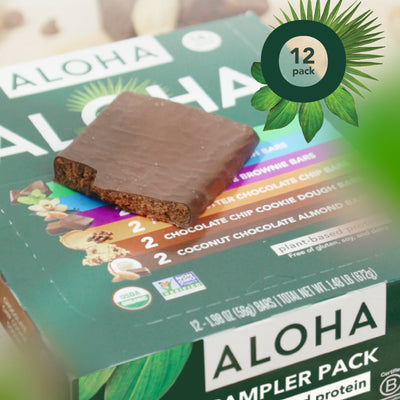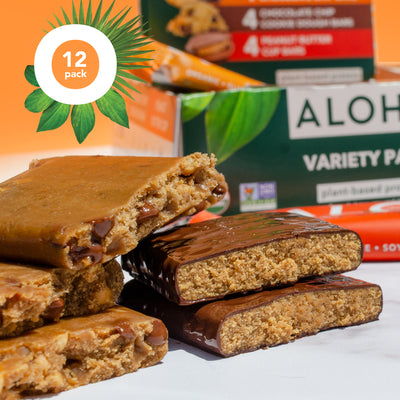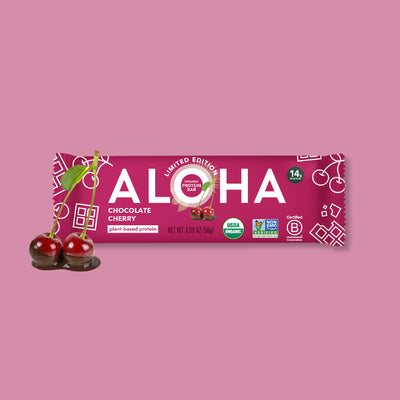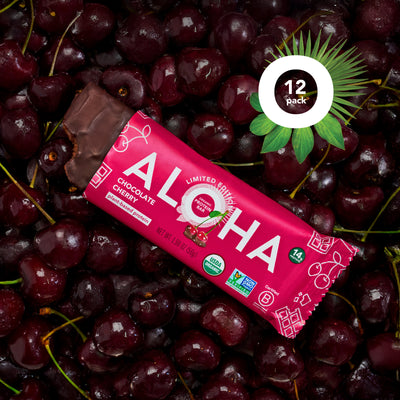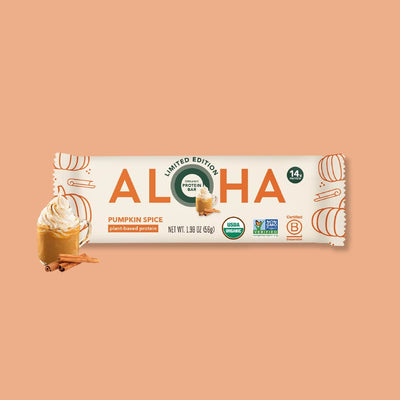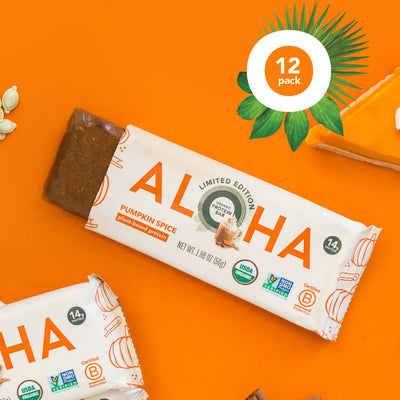Key Takeaways:
- Protein Is Essential for Runners: Protein is important for staying energized and feeling good after a run.
- Plant-Based Protein Can Be Just as Effective: Plant-based protein sources provide essential amino acids and nutrients that contribute to overall wellness.
- Timing & Consistency Matter: Spreading protein intake throughout the day helps support a balanced diet and steady energy.
Running can be tough on your body. After a long run, your muscles are tired, and your energy is drained. Protein plays an important role in helping your body bounce back and feel ready for your next workout.
At ALOHA, we believe that proper nutrition is key to running your best. We offer high-quality, plant-based protein that helps runners fuel their bodies with the nutrients they need. Whether it's a protein-packed snack or a shake post-run, we focus on wholesome ingredients to help you feel your best.
This article will explore why protein is important for runners, how much you need, and the best ways to include it in your diet. Understanding protein’s role can help you run stronger, stay energized, and feel better overall.
Why Do Runners Need Protein?
Running is a high-impact activity that challenges your muscles, joints, and energy systems. With every step, your body experiences micro-tears in muscle fibers and uses up its energy stores. This is where protein comes in.
Protein helps:
- Post-Run Recovery: After running, especially long distances, protein can be part of a balanced routine that helps you bounce back and feel less fatigued.
- Energy Support: While carbs are your primary energy source, protein can provide support when glycogen stores are low, helping you keep going during long runs.
- Overall Resilience: A protein-rich diet can support strong, stable movement during activity.
- General Wellness: Intense training can sometimes impact how you feel day to day. Protein contributes to essential bodily functions.
Without enough protein, runners may experience delayed recovery and increased fatigue. Protein plays a key role in helping your body stay on track and support daily movement.
How Much Protein Do Runners Actually Need?
Many people think only athletes focused on strength need extra protein, but runners also need more than the average person. Protein is crucial to support recovery and performance during training.
General Protein Recommendations
- Casual runners (light jogging, 2–3 times per week): 0.8–1.0 grams per kilogram of body weight
- Endurance runners (long-distance training): 1.2–1.6 grams per kilogram of body weight
- Strength-focused runners (sprinters, trail runners, or those doing weight training): 1.6–2.0 grams per kilogram of body weight
For example, a 150-pound (68 kg) runner would need about 82–109 grams of protein per day.
Benefits Of Protein For Performance & Recovery
Protein is more than just a muscle-building nutrient—it’s a key player in feeling recovered and ready for your next workout. Whether you’re training for a race or running to stay active, getting enough protein can help you feel better and stay consistent. Below, we break down the essential ways protein supports runners:
Improved Muscle Recovery & Reduced Soreness
Every time you run, your muscles undergo tiny tears that need to be repaired to grow stronger. Eating enough protein after activity can support your body’s natural recovery process. Without enough protein, you might feel more tired after workouts.
Enhanced Performance & Sustained Energy
Carbohydrates are the primary fuel for runners, but protein plays a crucial supporting role in maintaining endurance and preventing energy crashes. When glycogen (stored energy from carbs) is depleted, the body can turn to protein as an alternative energy source, helping you push through longer runs. A steady intake of protein as part of your meals and snacks can help support sustained energy.
Stronger Muscles, Joints & Injury Prevention
Running puts repetitive stress on muscles, joints, and connective tissues. Including protein in your diet supports overall strength and stability.
Boosted Immune System & Faster Recovery
Training can sometimes leave you feeling run-down. Getting enough nutrients, including protein, helps support your body’s natural recovery processes.
Improved Metabolism & Lean Muscle Maintenance
Protein is a filling macronutrient that can help keep you satisfied between meals. Including it regularly may help support body composition and long-term energy.
When Should Runners Consume Protein?
It’s not just about how much protein you consume, but when you consume it. Timing your protein intake can help support daily wellness and recovery.
- Pre-Run Protein: A small amount of protein 1–2 hours before a run can provide energy without weighing you down. Opt for easily digestible options like a protein smoothie or a handful of nuts.
- Post-Run Protein: The first 30–60 minutes after a run is the best time to consume protein. This helps your muscles recover faster and prepares you for your next workout.
- Throughout The Day: Aim to spread your protein intake across your meals and snacks to keep your muscles supported throughout the day.
- Nighttime Protein: A small snack before bed, such as a protein shake or a handful of nuts, can help support your muscles during the overnight recovery period.
Plant-Based Protein For Runners: A Smart Choice
Some runners assume animal-based protein is the best choice, but plant-based protein can be just as effective. It offers essential amino acids, fiber, and additional nutrients that support a well-rounded diet.
Benefits Of Plant-Based Protein:
- Complete Amino Acids: Many plant-based proteins, like quinoa, soy, and hemp seeds, provide all nine essential amino acids for muscle recovery.
- Anti-Inflammatory & Gut-Friendly: Many plant-based proteins are gentle on digestion and can be part of a routine that supports post-run recovery. They also support healthy digestion, making it easier for your body to absorb nutrients.
- Heart Health & Sustainability: Plant-based proteins are often lower in saturated fat and can be part of a balanced diet that supports long-term wellness.
Many runners assume that animal-based protein is the best option for muscle recovery, but plant-based protein can be just as effective—if not better—for endurance athletes. Packed with essential amino acids, fiber, and anti-inflammatory compounds, plant-based protein supports muscle repair while benefiting digestion, heart health, and overall wellness. Here’s why plant-based protein is a smart choice for runners:
Best Plant-Based Protein Sources For Runners
- Protein Bars & Powders – Convenient and plant-based options for on-the-go fuel.
- Legumes – Beans, lentils, and chickpeas are rich in protein and fiber.
- Grains – Quinoa and brown rice provide quality plant protein.
- Seeds – Hemp, chia, and flaxseeds are excellent sources of protein and omega-3s.
- Tofu & Tempeh – Packed with protein, these soy-based foods support muscle repair and energy.
By incorporating plant-based protein into their diet, runners can enjoy nourishing, convenient snacks that help power their day. Whether training for a marathon or enjoying casual runs, plant-based protein offers a clean, effective, and sustainable way to fuel your performance.
Final Thoughts
Protein is an essential nutrient for runners, helping with balanced energy, recovery, and staying active. Whether you choose plant-based or other protein sources, the key is to prioritize protein in your diet and spread it throughout the day for optimal results. Fuel your runs with the right nutrients, and you’ll see the difference in your routine and how you feel.
Read also:
- How Protein Helps Build And Repair Muscles
- How To Calculate Your Ideal Protein Powder Intake
- Protein Intake Tips For Athletes: Boost Recovery
Frequently Asked Questions About Do Runners Need Protein
Do runners need more protein than non-runners?
Yes, runners require more protein due to the physical demands of running and muscle recovery.
Can too much protein harm a runner’s performance?
Excess protein may lead to discomfort if not balanced with hydration and carbohydrates. A balanced intake is ideal.
Is it okay for runners to get all their protein from supplements?
Whole food sources provide additional nutrients that supplements may lack. A mix of both is the best approach.
Can plant-based runners get enough protein?
Yes, by combining various plant-based protein sources like legumes, grains, and seeds, runners can easily meet their protein needs.
Sources:
1. Stožer, A., Vodopivc, P., & Križančić Bombek, L. (2020). Pathophysiology of exercise-induced muscle damage and its structural, functional, metabolic, and clinical consequences. Physiological Research, 69(4), 565–598. https://doi.org/10.33549/physiolres.934371
2. Joyce) Chen, C. ., Thompson, L. D. V., & Snow, L. A. (2017). Muscle Structure and Function. Orthopaedic Physical Therapy Secrets, 1–9. https://doi.org/10.1016/b978-0-323-28683-1.00001-1
3. Kanter, M. (2018). High-Quality Carbohydrates and Physical Performance. Nutrition Today, 53(1), 35–39. https://www.ncbi.nlm.nih.gov/pmc/articles/PMC5794245/
4. Brumitt, J., & Cuddeford, T. (2015). CURRENT CONCEPTS OF MUSCLE AND TENDON ADAPTATION TO STRENGTH AND CONDITIONING. International Journal of Sports Physical Therapy, 10(6), 748. https://pmc.ncbi.nlm.nih.gov/articles/PMC4637912/
5. Turnagöl, H. H., Koşar, Ş. N., Güzel, Y., Aktitiz, S., & Atakan, M. M. (2021). Nutritional Considerations for Injury Prevention and Recovery in Combat Sports. Nutrients, 14(1), 53. https://doi.org/10.3390/nu14010053
6. Shao, T., Verma, H. K., Pande, B., Costanzo, V., Ye, W., Cai, Y., & Bhaskar, L. V. K. S. (2021). Physical Activity and Nutritional Influence on Immune Function: An Important Strategy to Improve Immunity and Health Status. Frontiers in Physiology, 12(751374). https://doi.org/10.3389/fphys.2021.751374
7. da Luz Scheffer, D., & Latini, A. (2020). Exercise-induced immune system response: Anti-inflammatory status on peripheral and central organs. Biochimica et Biophysica Acta. Molecular Basis of Disease, 1866(10). https://doi.org/10.1016/j.bbadis.2020.165823
ALOHA's products are not intended to treat, diagnose, mitigate, prevent, or cure disease. ALOHA's products should not replace prescribed medications or the variety of foods important to a healthful diet.
Do not self-diagnose any health condition. Work with your healthcare provider to determine how best to achieve optimal health.






